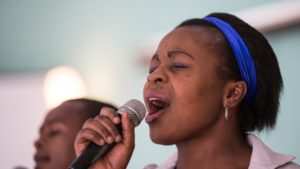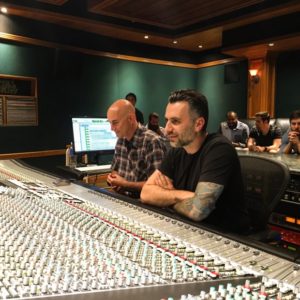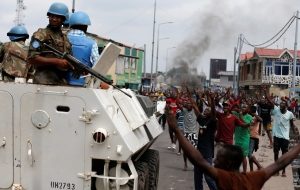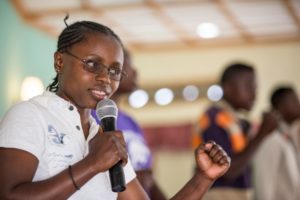Canada’s Make Music Matter project offers psychological therapy through music

“Within me is a lawyer that will right all the inequities / Within me is a president that will fix the country.”
Those empowering lyrics appear in the song Mon corps n’est pas une arme (My Body Is Not a Weapon), by a singer named Sandra. In the background, a distinctively African beat gets mashed up with a bit of hip-hop.
The tune is just one of several that appear on two albums written and performed by civilian war victims from Congo and recently released through Warner Music Canada. The albums Mon corps n’est pas une arme and Keshu ni situ mupya (Tomorrow Is a New Day) were recorded in Swahili and French, and contain a total of 12 songs.
It was partly through the work of Winnipeg-based music producer Darcy Ataman that Sandra’s composition became a full-fledged song.
“She was raped, became pregnant, lost the child, became HIV positive from the rape and spent time in hospital,” said Ataman, who oversaw the recording and is the founder and CEO of the Canadian charity Make Music Matter. She “came to our program for healing and wrote the song.”

Starvation, disease and violence are common lyrical themes on the albums, written and performed by those who experienced it first hand.
The music is “incredibly powerful, it resonates with other people,” said Ataman. “If you live in active conflict zones, one of the last things you can take away from somebody is the ability to sing. That’s why [the music] works so well.”
‘Africa’s world war’
The release of the albums is an effort to draw the Western world’s attention to what has been commonly called “Africa’s World War.”
“Hearing these songs en masse, people can begin to understand and empathize,” said Ataman.
Congo, formerly Zaire, has a long and troubled past. Most recently, civil war broke out in 2009 between armed ethnic militias and the government over mineral resources, subjecting millions of civilians to attacks, starvation and disease and rape.
Congo is currently home to the UN’s biggest peacekeeping operation. Fifteen Tanzanian peacekeepers were recently killed there.
Civilian protests have been directed at President Joseph Kabila, who after 17 years in power is refusing to step down after his term limit expired in 2016. Elections are scheduled for December of this year, although the UN expressed doubt this week that they’ll happen.

Over the last several years, Make Music Matter has worked in eastern Congo setting up small recording studios in hospitals, schools and community centres to allow victims of war a chance to open up about their experiences through music.
“The artists come in, write and record songs about their experiences with a local music producer and a local psychologist that unlocks trauma that has never been talked about,” said Ataman.
As they learn to write and perform, the victims get counselling and, in Ataman’s words, become artists.
Songs of experience
The songs are written and recorded in Africa, then sent via the internet to Metalworks Studios in Mississauga, Ont., for post-production.
Students work on the final mixes, polishing them for release, all the while taking care to keep the essence of the songs true to the original performances.
Make Music Matter is supported by a list of well-known Canadian musicians. It was Billy Talent guitarist Ian D’Sa who took the idea of a record to Warner Music Canada.
“I think it will be interesting for anyone to just listen to this person, someone across the ocean, on the other side of the world, and their life experience,” said D’Sa. “It will be incredibly interesting to hear some of the things that other people have gone through in their lives and things that have happened to them in another country that you’ve never even been to.”
Make Music Matter has recently expanded to Rwanda and Warner Music Canada says it will release more albums.
Not looking for a hit
No one is expecting the next Drake to emerge from these songs, although Ataman said they’ve already been heard by about five million people in Africa.

So far, the albums haven’t had huge commercial success, but should one song catch on, publishing and licensing arrangements have been put in place that would see all of the artists involved in a song get paid.
Ataman said it’s more about giving victims a voice and a platform.
He said that when Mon corps n’est pas une arme started playing on radio in the eastern Congo city of Bukavu, calls started coming in from members of the military, who were concerned about their reputation.
“What I enjoy the most is when the military calls into the [radio] stations to complain, saying, ‘No, no, we’re not doing the rapes, we are the good guys,'” said Ataman. “It’s fascinating that someone with bullets is scared of someone with songs.”


